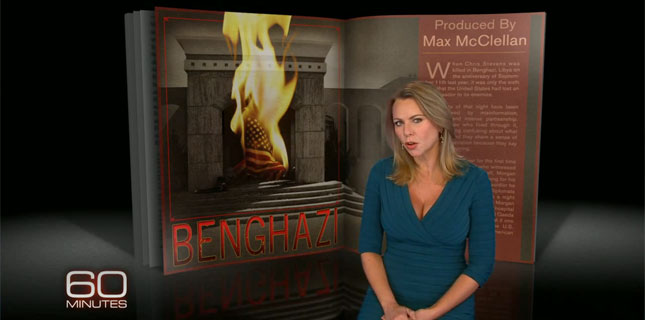The Benghazi Report Questions CBS Still Hasn't Answered
Written by Matt Gertz
Published
 CBS News has finally offered more than a blanket statement in support of their controversial report on the September 2012 attacks on U.S. diplomatic facilities in Benghazi, Libya. But the network has yet to grapple with the pressing questions surrounding their reporting.
CBS News has finally offered more than a blanket statement in support of their controversial report on the September 2012 attacks on U.S. diplomatic facilities in Benghazi, Libya. But the network has yet to grapple with the pressing questions surrounding their reporting.
The October 27 60 Minutes segment has come under fire from veteran journalists following the revelation that the Benghazi security contractor “witness” featured in the report had apparently changed his story about the night of the attack. The supposed “witness,” later identified as Dylan Davies, told CBS that he had gone to the diplomatic compound that night and confronted an attacker. But his story on CBS didn't match his company's incident report, which indicated that he “could not get anywhere near” the compound the night of the attack. The contractor claimed that he had lied to his boss about his whereabouts that night, but told the truth to CBS and in his book about the attacks, which was featured during the segment.
Media Matters founder David Brock has called on CBS News to form an independent investigative committee to review the report, similar to the one established after questions were raised about a 2004 story on President George W. Bush's service in the Air National Guard.
One of the leaders of that investigation, former Associated Press CEO and president Louis Boccardi, told Media Matters that the lesson of that review -- to get the facts quickly and disclose them publicly -- should not be forgotten as the Benghazi report comes under scrutiny.
But CBS News has shown no inclination to take that advice.
Last week, a spokesman would say only that the network stands behind their story. In a November 5 interview with the New York Times, Lara Logan, the correspondent who anchored the report, claimed that they had “killed ourselves not to allow politics into this report” and offered the obviously false statement, “If you read the book, you would know he never had two stories. He only had one story.” Even Davies himself has acknowledged giving a different story to his boss than he provided to CBS and in his book -- the question is which time he lied.
CBS did acknowledge one ethical misstep in the report -- their failure to acknowledge that Davies' book, which the report promoted, was published by a CBS subsidiary.
But the network has failed to answer key questions that continue to swirl around the report, and has apparently been dodging questions from other reporters - behavior that points to having less faith in their reporting then they are claiming publicly.
Here are the questions that CBS News should answer to demonstrate the credibility of their work:
1) Was CBS News aware of the incident report indicating that Davies “could not get anywhere near” the Benghazi compound on the night of the attack prior to releasing their story?
2) Did CBS News learn at any point during their year-long Benghazi investigation that Davies had previously offered a contradictory take on his activities? If so, why didn't they reveal that to their audience?
3) What steps did CBS News take in attempting to verify that the story Davies had told them was true?
4) Was CBS News aware that another reporter says he spoke “a number of times” to Davies but ceased communication “when he asked for money”? Did Davies ever ask CBS News for money?
5) Will CBS News revisit the story on-air now that new details have emerged that bring their original story into doubt?
Rather than answer these key questions, CBS News has claimed that criticism of their report is political. But as Huffington Post media reporter Michael Calderone noted, “It's not. It's Journalism 101.”
UPDATE: In an email to Calderone, 60 Minutes executive producer Jeff Fager defended the report, again without addressing any of what the Huffington Post reporter terms “fundamental questions about why the 60 Minutes report should be trusted in light of Davies' admission that he previously lied about his whereabouts.”
Instead, Fager simply says the network is “proud of the reporting that went into the story and have confidence that our sources, including those who appeared on 60 Minutes, told accurate versions of what happened that night.”
From the article:
“We spent more than a year reporting our story about the attack on Benghazi, which aired on Oct. 27, speaking with close to 100 sources in the process,” Fager, who also serves as CBS News' chairman, wrote in an email.
“Our effort was to give our viewers a better understanding about an event in which a U.S. ambassador and three other Americans were killed,” Fager wrote. “We are proud of the reporting that went into the story and have confidence that our sources, including those who appeared on ”60 Minutes," told accurate versions of what happened that night."
But Fager's statement does not address fundamental questions about why the “60 Minutes” report should be trusted in light of Davies' admission that he previously lied about his whereabouts.
Did “60 Minutes” know Davies had told his employer that he wasn't at the compound during the attack? And if “60 Minutes” was aware of Davies' previous statement, how did the program vet his new account, given that no other witnesses saw him there? Does “60 Minutes” have evidence to be confident that Davies' dramatic second account is accurate?
For more on conservative media myths about the September 2012 attack, read The Benghazi Hoax, the new e-book by Media Matters' David Brock and Ari Rabin-Havt.